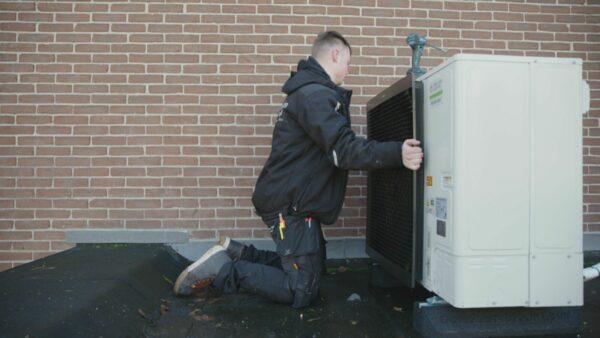Energy label increasingly important: buyers may borrow more for green home

Until recently, homebuyers hardly looked at the energy label of a house they were interested in. That was already changing over the past few years, mainly due to increased energy prices. And since 1 January, something else has been added: new mortgage rules. The better the energy label, the more someone is allowed to borrow to buy a house.
For a house with the very best energy label, a buyer may now borrow up to 50,000 euros more than for houses with the three worst energy labels. Because you spend much less on your monthly energy bill with an energy-efficient house, you may spend more on your mortgage, is the thinking.
"Two years back, people thought a new kitchen was more important than the energy label," says Marco Verbrugge of Verbrugge Realty. "But since the energy crisis, the label is relevant. We haven't all suddenly got a green heart, it's the wallet that speaks. And this year, different mortgage conditions really do apply. This is a new phenomenon. What the effects will be, we have yet to see. The rules have only just taken effect."
Promoting sustainability
These new rules should encourage homeowners to make their homes more sustainable. Because when selling, a house with a good label is more attractive than one with a poor label.
Perfectkeur provides energy labels and also advises residents on sustainability. "Last year, demand had already increased, but even more so in the last few months," says Floor Vermeulen of Perfectkeur.
"Estate agents are aware of the new lending standards and urge sellers to put their house on the market with the best possible label," observes Vermeulen. "These then look to see if there are any minor interventions possible to improve the label. You can really see that estate agents and homeowners are working on that now."
Extra mortgage for savings measures
At the same time, the new rules also consider buyers of houses with a poor energy label. They too can borrow extra, but only to make the new house more sustainable with that money. "For these homes, more can be borrowed responsibly because once they have been made more sustainable, savings can be made on energy bills." said the government.
For the three worst labels (E, F and G), buyers can borrow an extra 20,000 euros. So that money may not go towards buying the house, but must be spent on making it more sustainable. Such as insulation or a heat pump.
Mortgage lender ING welcomes the new rules. "By investing in sustainability, the house retains its value and the financial vulnerability for the resident decreases. We believe that sustainability should be part of every advisory consultation."
Rabobank is also positive. "These rules provide an incentive to become more sustainable. At the same time, sustainability remains a considerable challenge for many owners. Financially, but also practically." That's why, since last month, the bank has been reimbursing energy advice for customers with a G or F home. These can then receive 1,000 euros from the bank for an insulation measure.
It should be noted that mortgage lenders benefit from easing lending standards for sustainable homes. This helps in providing more loans.
Price differences
High energy prices have increased the price differences between houses with good and bad energy labels, observed brokers association NVM earlier. The coming time will show how these new mortgage rules affect the prices of houses with good and bad labels.
At advice chain De Hypotheekshop, they expect new builds to become more popular, because of the good energy labels and thus wider lending standards. Older flats, on the other hand, will become less popular, the advisers think. Because flats are part of an Owners' Association (VvE) and making them more sustainable is trickier within an association.
Mortgage rates fall
Overall, it is notable that mortgage rates have been falling for about 10 weeks in a row. "The average ten-year interest rate with National Mortgage Guarantee (NHG) currently stands at 3.99 per cent and is down more than half a percentage point compared to November," said Mark de Rijke of De Hypotheker, another advice chain. A fall in mortgage interest rates could push up house prices. Because the lower the interest rate, the more borrowing space homebuyers have.
Mortgage adviser Van Bruggen Adviesgroep therefore expects house prices to rise this year. Because of falling mortgage interest rates and rising incomes, but also because homes with a good energy label can now be borrowed more. In addition, lending standards for single people have been relaxed, allowing them to get up to 16,000 euros more in mortgage.
SOURCE: Energy label increasingly important: buyers may borrow more for green home (nos.nl)
